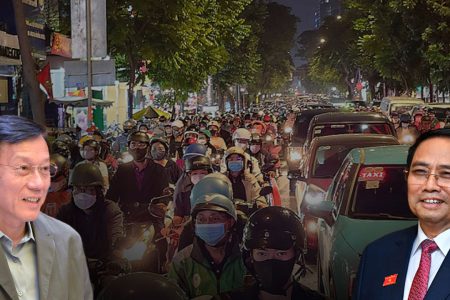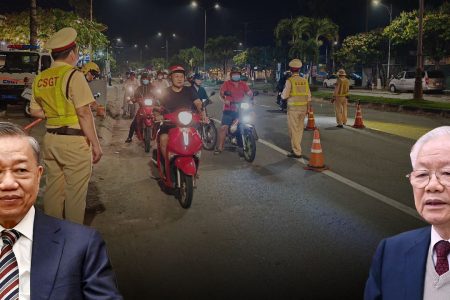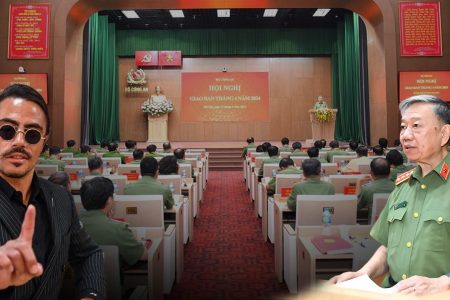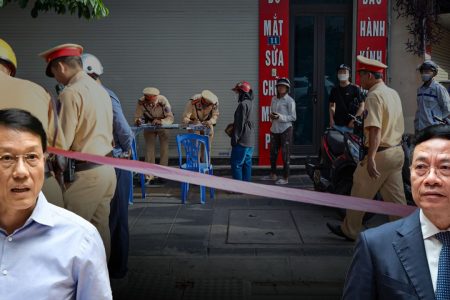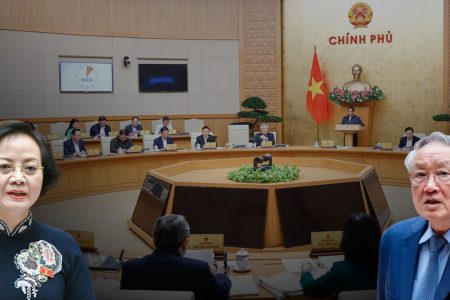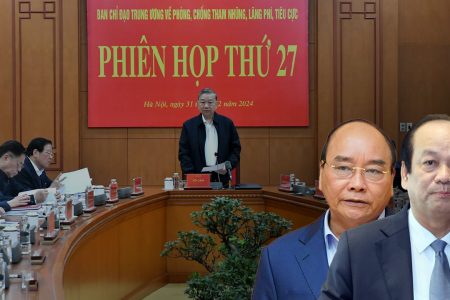Contrary to the opinion of the Council of Judges of the Supreme People’s Court and Chief Justice Nguyen Hoa Binh, the Vietnamese National Assembly (NA)’s Judicial Committee has concluded that serious violations of the proceedings “could change the case substance.”
At the same time, the social network was bursting with a series of articles and comments about the extremely obstinate and decisive subjective statements of Chief Justice Nguyen Hoa Binh in a NA’s meeting.

On June 16, 2020, the Judicial Committee held a plenary session to review the entire double murder case in Cau Voi post office in 2008, in which the focus was on the correctness and legality of the Decision of the cassation No. 05/2020 / HS-GĐT of May 8, 2020 of the Supreme People’s Court Judges Council.
The plenary session was held due to petition of Ho Duy Hai’s family and some legislators. The Danang legislators’ delegation also sent a petition to the NA’s Standing Committee asking for reviewing this case after the cassation decision of the Supreme People’s Court of Judges on May 8.
Accordingly, Judicial Committee members review all investigations, prosecutions and trials from the first instance to the appeals, but specifically consider the cassation decision of the Supreme People’s Court of Judges on case.
The Judicial Committee will make a written request to the NA’s Standing Committee to request a review of cassation review decisions
The source also said that most members of the Judicial Committee agreed on the idea that the NA’s Justice Committee will issue a report and propose to the NA’s Standing Committee to request the Chief Justice of the People’s Court to review the cassation procedure according to its competence, provided for in Article 404 of the Criminal Procedure Code.
According to representatives of the Judicial Committee, other cases only need 1 of 4 grounds to appeal against the cassation according to the law to be able to appeal, while Ho Duy Hai case has all 4 bases. : Investigative interrogation at a trial in a superficial or incomplete trial; the conclusion in the judgment or decision is inconsistent with the objective circumstances of the case; serious violations of legal proceedings in investigation, prosecution or adjudication; there are serious mistakes in applying the Criminal Code.

Investigation and interrogation at court sessions are not complete and inconsistencies in the case cannot be clarified. The conclusion in the judgment is not consistent with the objective circumstances of the case, the alibi evidence of Ho Duy Hai has not been considered and carefully evaluated, leading to the conclusion in the judgment about the time Ho Duy Hai was present at Cau Voi Post Office not yet convinced. The conclusion in the judgment is wrong with the assessment conclusion. The appellate judgment reflects incorrectly on the first instance trial. The verdict is based on the “deadly inference” of investigation conclusions and indictments.
Another point, according to the Judicial Committee’s Report, is that the investigating authority and the authorities all choose to use evidence that is beneficial in accusations, without honestly and objectively reflecting the evidence for the defendant’s innocence.
Judicial Committee said that: The investigation and interrogation at the trial were incomplete, did not clarify the contradictions in the case.
Members of the Judicial Committee at the meeting assessed the violations in the process of investigation, prosecution and adjudication of the case are serious, which may change the nature of the case.
Thus, contrary to the opinion of the Council of Judges of the Supreme People’s Court in the cassation session released on May 13 which said the process of investigation and prosecution has made a mistake but does not change the nature of the case.
Facebook of journalist Truong Chau Huu Danh posted a short message: “There have been 8 deaths. Now one more person is waiting to die (52 years old).”
According to unconfirmed sources, the person who is paralyzed in this place is Mr. Dinh Van Sang, director of the People’s Procuracy of Long An province, who stated the definitive death sentence for Ho Duy Hai on Dec 7, 2017 in a live broadcast on television in Long An province. In this clip, Mr. Sang asked the parliament to “decisively execute Ho Duy Hai,” that is, to kill Ho Duy Hai as soon as possible.
A series of comments and analysis of Facebook by journalists and lawyers showed the weakness in the justifications of Chief Justice Nguyen Hoa Binh before the NA.

Assumption and Evidence is the title for the commentary of Dr. Nguyen Si Dung – former deputy chairman of the NA Office, he wrote the following:
As Mr. Nguyen Hoa Binh said Ho Duy Hai was the person committed the crime so he successfully recognized the weapon he had used in the crime- that is the type of assumption of accusation but not innocence assumption.
Judgment saying “The fact that Ho Duy Hai correctly identified weapons may be a result of coerced confession but does not prove that he had committed the crime” is an innocent assumption.
Fingerprints, bloodstains, and hair on a weapon or on the victim are direct and objective evidence. These are undeniable and indisputable evidence. When these pieces of evidence are not collected, all is speculation. What is speculation, it may be true and maybe wrong.
However, innocence assumption can lead to the failure to catch the crime perpetrator(s), but never leads to legal miscarriage. On the contrary, a guilty assumption can both lead to injustice and also to the failure to catch the actual crime perpetrators,” Dr. Nguyen Si Dung concluded.
This also coincides with the opinion of many lawyers that Mr. Nguyen Hoa Binh did not have the thinking about the principle of innocence assumption, which can be said to be a basic principle of the Criminal Law.
Facebook Le The Thang made the point that:
“Chief Justice Nguyen Hoa Binh at the cassation review session in early May may be due to the blindness of the file, so the judgment and conclusion about such a case, although very silly, still have something acceptable.
But Chief Justice Nguyen Hoa Binh at the National Assembly forum like yesterday, after a lot of mistakes and omissions in the investigation and proceedings of the case were exposed but still protected his view point with silly arguments- that was hopeless.
His act is a hopeless not only for Ho Duy Hai and his family, but for the all Vietnamese people.
This country runs out of people to run for leaders?”
Facebooker Nguyen Quoc Viet fears that the same 17 judges will continue in the name of justice to make a decision with the name that is called “Board of cutting boards.”

Facebooker Nguyen Quoc Viet said:
The NA’s Chairwoman needs to set up a temporary Constitutional Council (because we do not have a Constitutional Court yet) to review the cassation decision of the Supreme Court for the Cau Voi post office case.
It is impossible for the “Chopping Board” to review their previous decision, and to vote the same as before.
What happens if they do not accept the recommendations of the NA’s Standing Committee and keep their decision?
Attorney Nguyen Kieu Hung made an analysis with the title Unusual?
“Examining the scene, a picture of the bloody cutting board, which was destroyed because police investigators didn’t think the cutting board was a murderous weapon, was the first abnormality.
The second anomaly is, the local militia discovered the knife but threw it away. Authorities should keep the knife because the victims’ throats were cut.
The third abnormality is not collecting fingerprints, bloodstains immediately upon examination of the scene.
These abnormalities, if logical inference, are unlikely to be inadvertent, subjective or outdated by the investigating authority.
I questioned the signs of intentionally altering the scene, erasing the crime track, until they decided to arrest Ho Duy Hai.
The investigating agency of the Supreme People’s Court must take its actions in the case!”
Lawyer Tran Dinh Dung released new information that:
Removing Ho Duy Hai’s complain of innocence and keeping his confessions of guilty: bad conduct of the investigators.
In the dossier submitted by the People’s Procuracy to the NA’s Judiciary Committee, it is detailed that “The defendant’s first testimony not pleading guilty was not included in the case file nor included in the record of the investigation agency’s reserve.”
As such, this is clearly a terrible misconduct by the Investigation Agency. After Ho Duy Hai’s confession was drawn, only the confession was left.
So far, Long An provincial authorities have informed that Hai in all the plaintiffs pleaded guilty, only asking for a reduction of punishment. Even his confession letter was signed by a lawyer (but he was a former police investigator of the Long An province’s Police Department).
Does the investigators conduct investigation according to the law, lawyer Dung asked.
Thoibao.de (Translated)







